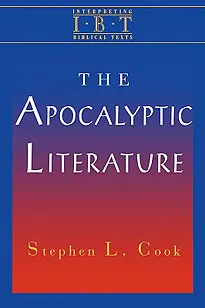

The Apocalyptic Literature
in Interpreting Biblical Texts
Pages
233 pages
Publisher
Abingdon Press
Published
10/1/2003
ISBN-13
9780687051960
Biblical texts create worlds of meaning and invite readers to enter them. When readers enter such textual worlds, which are strange and complex, they are confronted with theological claims. With this in mind, the purpose of the IBT series is to help serious readers in their experience of reading and interpreting by providing guides for their journeys into textual worlds. The focus of the series is not so much on the world behind the text as on the worlds created by the texts in their engagement with readers.
Nowhere is the world of the biblical text stranger than in the apocalyptic literature of both the Old and New Testaments. In this volume, Stephen Cook makes the puzzling visions and symbols of the biblical apocalyptic literature intelligible to modern readers. He begins with definitions of apocalypticism and apocalyptic literature and introduces the various scholarly approaches to and issues for our understanding of the text. Cook introduces the reader to the social and historical worlds of the apocalyptic groups that gave rise to such literature and leads the reader into a better appreciation and understanding of the theological import of biblical apocalyptic literature.
In the second major section of the book, Cook guides the reader through specific examples of the Bible’s apocalyptic literature. He addresses both the best-known examples (the biblical books of Daniel and Revelation) and other important but lesser known examples (Zechariah and some words of Jesus and Paul).
Reviews
Stephen Cook�s book on Apocalyptic literature is a new volume in the series Interpreting Biblical Texts, edited by Gene M. Tucker and Charles B. Cousar. The series aims to help serious readers in their experience of reading and interpreting biblical texts and to provide guides for their journeys into textual worlds. The focus is not on the world behind the texts but on the world created by the texts in their engagement with readers. The aim is pedagogical. Therefore, the authors are more concerned about guiding the reader than engaging in debates with other scholars (9�10). On the whole, Cook conforms to these general aims, and his book should be read in the light of the scope of the series. Because of the special character of the topic of the book, he focuses less on specific tools for interpretation than on general interpretive stances (11): �gaining familiarity with some broad he rmeneutical insights and caveats will assist the reader in letting the apocalyptic texts speak in as plain, authentic and theologically relevant a manner as possible. The alien and offensive traits of apocalyptic texts make them an exciting and exacting testing ground for hermeneutics. They are perhaps unique among the Scriptures in yielding their intelligibility only to a disciplined, self-reflective theological interpretation� (11�12). These hermen eutical aspects are discussed in part 1, �Issues in Interpreting Apocalyptic Texts� (chs.
[Full Review]
